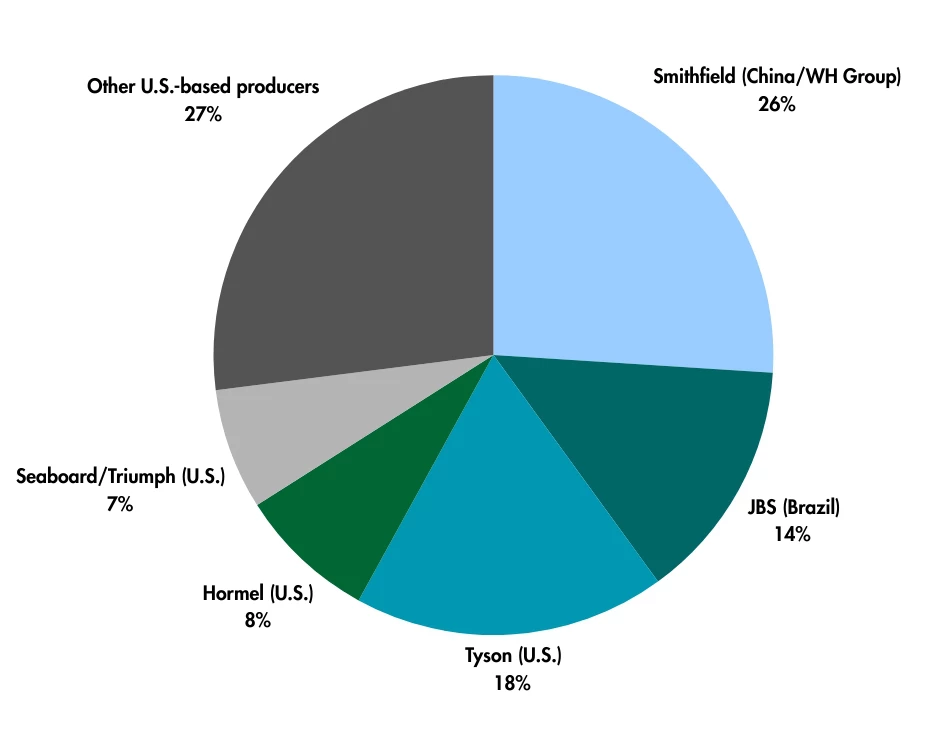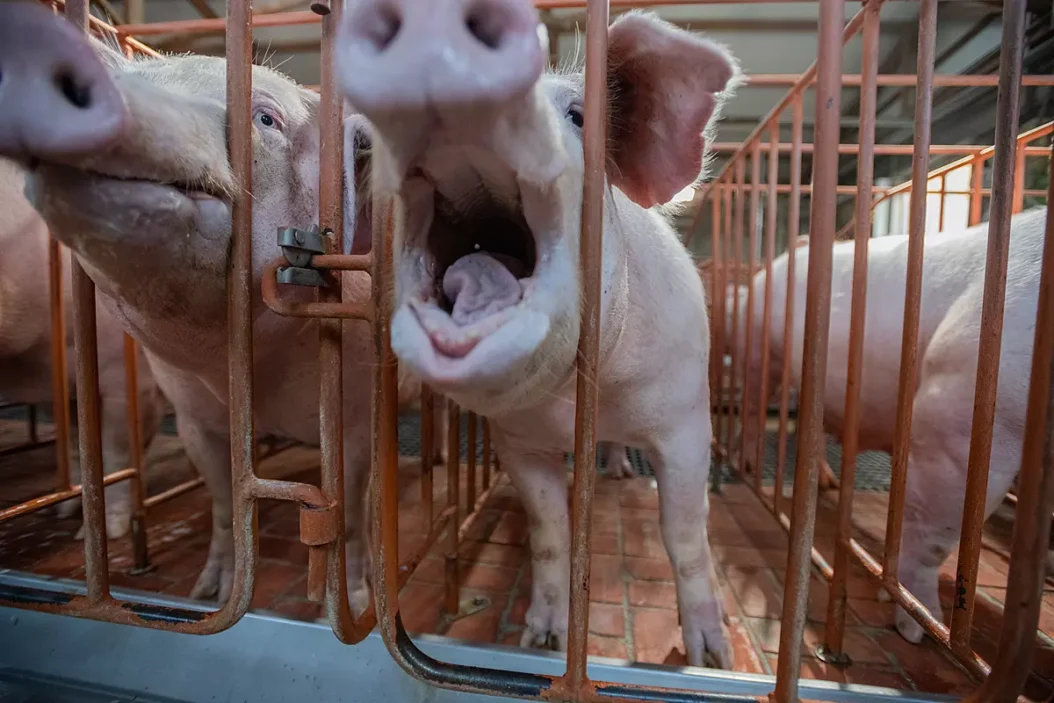NEWS ANALYSIS
China’s Smithfield Foods: Profiting from Prop 12 While Pushing to Overturn It
The Chinese-owned pork giant is pushing to kill animal welfare laws even as it profits from sales in California

By the Editors
Chinese-owned Smithfield Foods (NASDAQ: FSD), the largest pork producer in the United States, is leading the industry charge to overturn California’s Proposition 12 (and by default Massachusetts’ Question 3) through congressional legislation while simultaneously supplying Prop 12-compliant pork to the state through its subsidiaries. The move betrays a strategic hedging approach that maintains market access for the company while it campaigns for regulatory elimination of the laws.
Smithfield Foods, which controls approximately 26% of U.S. pork production, was acquired by China’s WH Group for $4.72 billion in 2013 in what remains the largest Chinese acquisition of an American company. The company, with headquarters in Smithfield, Va., but whose board of directors consists exclusively of non-nationals who are residents of China, has emerged as a primary supporter of the Food Security and Farm Protection Act, S. 1326, and the Save Our Bacon Act, H.R. 4673, while quietly ensuring its continued access to California’s 39-million-person-strong market.
A Legal Losing Streak Spurs a Pivot to Congress
California’s Prop 12, approved by voters in 2018 with 62.6% support, prohibits the sale of pork, veal, and eggs from animals confined in spaces that prevent basic movement. For breeding pigs, this means at least 24 square feet of space where sows can turn around, lie down, stand up, and fully extend their limbs. The law took effect January 1, 2024, after years of unsuccessful industry legal challenges from the National Pork Producers Council and its surrogates.
The pork industry’s primary challenge came in National Pork Producers Council v. Ross, where the NPPC argued that Prop 12 violated the Commerce Clause by regulating out-of-state production. In May 2023, the Supreme Court ruled against the NPPC, with conservative Justice Neil Gorsuch, appointed by President Trump, writing that states routinely regulate products sold within their borders. “Companies that choose to sell products in various States must normally comply with the laws of those various States,” Gorsuch wrote.
The Supreme Court decision marked the industry’s 19th consecutive legal defeat in the federal courts when it comes to animal welfare laws since 2002, when the first state anti-gestation crate policy was adopted by Florida. The industry made one subsequent attempt in Iowa Pork Producers Association v. Bonta, but the Supreme Court declined to hear the case in June 2025. Triumph Foods, a Missouri-based industrial pork producer, has appealed its loss in a U.S. District Court on a separate legal challenge to Question 3, which Massachusetts voters passed in 2016 and which provided the template for Prop 12 two years later. That case is pending before the U.S. Court of Appeals for the First Circuit.
Who controls America's pork production?

Profiting From the Very Standards They Seek to Destroy
The two bills — essentially a rebranding of the former EATS Act — would nullify state laws that impose standards on agricultural products sold in interstate commerce. Introduced by Joni Ernst, R-Iowa, in the Senate and Ashley Hinson, R-Iowa, in the House, the legislation represents the pork industry’s pivot to Congress after exhausting its options for legal attacks. The bill is primarily backed by the NPPC, with Chinese-owned Smithfield by far its dominant member.
According to the California Department of Food and Agriculture’s registered distributor list, Smithfield subsidiaries are now among more than 1,250 producers and distributors certified as Prop 12-compliant. The company reported more than $1 billion in operating profits in 2024, nearly four times its 2023 profit, with its “fresh pork” segment delivering profit growth for the third consecutive year.
Smithfield isn’t alone in this market approach. Other major industrialized pork producers supplying California with Prop 12-compliant products include JBS, Tyson Fresh Meats, Seaboard/Triumph, Clemens Food Group, Hormel, Premium Iowa Pork, and Premium Minnesota Pork. Seaboard, which announced in 2021 it would limit California sales rather than comply, is now listed as a registered distributor and reported increased operating income in 2024 due to “higher margins on pork products.”
Smithfield and other major industry players are executing a two-track playbook: profiting from Prop 12 by supplying California with compliant pork, while simultaneously spearheading efforts in Washington to erase the very standards underpinning those profits. The approach gives them maximum optionality—able to cash in on premium markets today, even as they work to dismantle the rules for tomorrow.
“What we’re seeing is a calculated business strategy where companies are hedging their bets,” said Dr. Thomas Pool, senior veterinarian with the Center for a Humane Economy. “Smithfield and others are maintaining access to the California markets while simultaneously funding efforts to eliminate the very standards that create these profitable opportunities.”
“Yet thousands of family farmers don’t have dual production capacity like the China-controlled Smithfield Foods,” Pool added. “If Congress overturns Prop 12, these family farmers are likely to go out of business. Family farmers don’t have the backing of the Chinese Communist Party to play both sides of this issue.”
Foreign Ownership Adds New Risks to U.S. Food Policy
The Chinese ownership of Smithfield adds another dimension to the EATS Act debate. Agricultural policy experts note that foreign-controlled companies now represent approximately 40% of U.S. pork production, with Brazil-based JBS controlling 14% and Chinese-owned Smithfield controlling 26%. “No major sector of American agriculture has a larger share of foreign ownership than the pig industry,” added Dr. Pool, who was a colonel in the U.S. Army and head of the U.S. Army Veterinary Command.
Meanwhile, Smithfield has maintained its public opposition to Prop 12. Company spokesperson Ray Atkinson stated that Smithfield “fully supports a federal legislative solution that will resolve a growing patchwork of state-by-state regulations that make it increasingly difficult to keep food affordable.” Notably, the U.S.-based egg industry, whose producers are primarily U.S.-based family operators, does not support the rebranded EATS Act, precisely because so many farmers producing eggs have switched to cage-free production, just like so many American-based hog farmers.
Smithfield Foods owns more than 400 pork production farms and works with over 2,000 additional contract producers spread across fifteen states. According to its 2024 Sustainability Report, the company has converted its company-owned sow farms to group housing systems and has stated that these systems are designed to align with evolving animal welfare standards such as those required by Prop 12.
In China, the fastest growing form of pig-housing standard is the high-rise factory farm. Some of the “farms” are 30 stories high, perhaps with more than 50,000 pigs in a single building. “The high-rise factory farms offer us a dystopian vision of agriculture that deviates from the American ideal of an American farmer making a living by working a plot of American soil,” added Dr. Pool.
“We don’t want China’s high-rise factory farms coming to America and we don’t want the Chinese Communist Party working through its U.S.-based trade associations to overturn American elections and American laws,” observed Pool, whose family still operates a cattle ranch in southwest Oklahoma. “We value animal welfare standards in our nation, and that’s why we have laws like Prop 12 to codify our moral standards.”
This week, Joseph Luter II, the son of founder of Smithfield Foods and who took over for his father and ran the company for years, died last month at the age of 86. His successor sold Smithfield Foods to China’s WH Group, a company closely tied to the Chinese government, in 2013. Smithfield’s annual sales are now approximately $15 billion a year.
More Action
1) Watch our webinar on the issue here. It features Wayne Pacelle, president of the Center for a Humane Economy, and staff veterinarians Dr. Jim Keen and Dr. Tom Pool.
2) To view the report from Dr. Pool, Dr. Keen, and Svetlana Feigin, Ph.D., go here.
3) To write your lawmakers in opposition to H.R. 4673 and S. 1326, go here.

WH Group acquires Smithfield
California voters pass Prop 12
Supreme Court upholds Prop 12 (NPPC v. Ross)
Prop 12 takes effect
Supreme Court declines Iowa Pork Producers appeal
Supreme Court declines Iowa Pork Producers appeal


